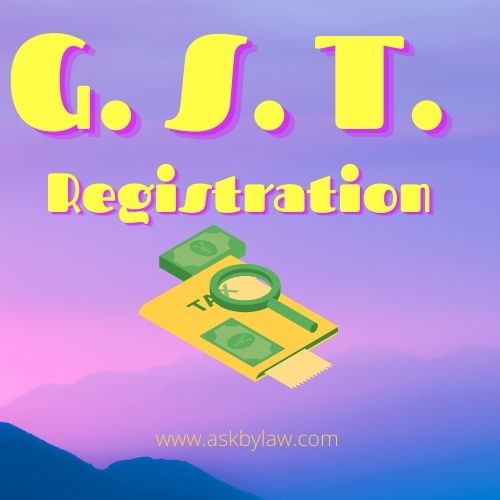
| Serial | Index of content |
| 1. | Introduction- G.S.T. registration number |
| 2. | G.S.T. Registration |
| 3. | G.S.T. registration number |
| 4. | G.S.T. registration in India |
| 5. | G.S.T. registration status |
| 6. | Vat G.S.T. registration number |
| 7. | G.S.T. registration fees |
| 8. | G.S.T. registration limit |
| 9. | G.S.T. registration documents |
| 10. | Category of G.S.T. registration number |
| 11. | E way bill |

First Now you watch G.S.T. registration number G.S.T. like a direct tax method us in India. It is a multi stage method, multistage meaning is, the G.S.T. is impose each n every stage in the production procedure. It means to refunded to all parties on various steps of production other than last channel consumer like a destination based tax- G.S.T. are provided into five different tax assessment slabs for collection of the tax. The tax rates rules and regulations are governed by the G.S.T. council which of the financial ministry of the central government, and all the states of India.

Now Registration of the any one business person under the G.S.T. First Registration law implies unique identification number from the G.S.T. More Registration authority to obtain input tax credit .without G.S.T. Finally Registration a business person cannot collect tax from his customer and cannot obtain input tax credit.
GSTIN is a G.S.T. identification number or G.S.T. number. GSTIN is a 15 digit PAN based unique identification number assigned to each registered person under G.S.T. like a G.S.T.-registered dealer, it is mandatory to verify the G.S.T. number (GSTIN) before you file your G.S.T. returns. There can be multiple GSTINs for the same person, being an assessor under the Income Tax Act for each state or union territory in which such person works. Obtaining GSTIN becomes mandatory when a person crosses the limit for G.S.T. registration by registering himself under G.S.T.
In the G.S.T. regime, the turnover of businesses which is Rs. 40 lakh (Rs. 10 lakh for NE and hill states) is required to be registered as a normal taxable person. This process of registration is called G.S.T. registration. For some businesses, registration under G.S.T. is mandatory. If an organization does business without registering under G.S.T., it will be an offense under G.S.T. and heavy fines will be imposed.
WHO CAN REGISTER?
After submitting the GST registration application, you will be given an Application Reference Number (ARN).
You can track the status of your application by tracking this ARN. Follow these steps to see the status of your ARN:
1. Go to: https://www.gstsearch.in/arn-status.html
Check Arn's condition
2. In the ARN field, enter the received ARN at your e-mail address when you submit the registration application.
3. In the Captcha field, enter the captcha text in the characters you see in the image below.
4. Click the SEARCH button.
Most businesses are required to register for Value Added Tax (VAT) or Goods and Services Tax (G.S.T.). Once registered, you will receive a VAT or G.S.T. number, under which you can collect and send the tax to the concerned tax authority. This number is an alphanumeric identifier specific to the person or entity doing the business. The VAT or G.S.T. number is used to identify the tax status of the customer and to identify the place of tax.
The G.S.T. registration fee depends on the type of business and which falls in the range of Rupees1199 to Rupees 000. It is a one-time fee, yet the process takes time.
For a regular G.S.T. registration certificate, it takes about 3-6 working days. However, if you need any further modification, it may take about 15-20 working days.
GST registration documents vary depending on what type of business people want to register for. However, the general documents required for each business to submit for the GST registration process are as follows,
• Permanent Account Number (PAN)
Passport size photograph
Card Aadhaar card or driving license or passport
Proof of business space address
• Bank statement or canceled check or passbook
For a private limited company / OPC / LLP / partnership firm, these documents must be included with their GST registration application.
Certificate of Investment in case of Limited Liability Company, OPC or LLP;
Partnership deed in the event of a partnership pay firm;
The opening page of a bank statement held in the name of the business or owner; Permission letter or board resolution
General Taxpayer: The largest businesses in India fall under this category. The applicant does not need to pay any deposit to fall into the category of general taxpayer. In addition, there is no expiration date for taxpayers falling under this category.
Casual Taxable Person: Those who want to start a seasonal business or shop can opt for this category. The taxpayer must deposit an advance amount equivalent to the expected G.S.T. liability during the time the seasonal business or stall is present. The G.S.T. registration period under this classification is three months, and can be extended or even renewed.
Rachna Taxpayer: Taxpayers who want to get G.S.T. Rachna Yojana can opt for this type of G.S.T. registration. Small taxpayers can free themselves from boring G.S.T. rules and refund G.S.T. at a fixed rate of turnover. Input tax credit could not be obtained by taxpayers in this category.
Non-Resident Taxable Person: If a person resides outside India, but provides goods and services to businesses residing in India, they should opt for this type of G.S.T. registration. Compared to the casual taxable person support of GST registration, taxpayers are required to pay a deposit which is the same as expected G.S.T. during G.S.T. registration is active. The duration of this type of GST registration is usually three months, although it can be extended or renewed at the time of expiration.
Overall turnover registration is required to apply
Previous Limits - To provide goods / services
Rs. More than 20 lakh yes - for general category states till 31st March 2019
More than Rs.10 lakhs Yes - till 31st March 2019 for Special Category States
New limits - for the sale of goods
More than Rs. 40 lakhs Yes - From 1st April 2019 for General Category States
Rs. More than 20 lakh yes - for special category states from 1st April 2019
New limitations - to provide services
No change has been made in the threshold limit for service providers. Individuals providing services are required to register if their total turnover is more than Rs 20 lakh (for general category states) and Rs 10 lakh (for special category states).
The e-way bill is generated manually by the consignor or consignee if the transport is done by own / hire or by rail, by air or by air. An e-way bill is to be generated by the transporter if the goods are handed over to the transporter for transport by road. Where neither the consignor nor the consignor generates e-way bill and if the value of the goods is more than Rs. 50,000 / -, the responsibility of generating it will be on the transporter. In addition, provision has been made that where the goods are sent by the principal located in one state to the job worker located in another state, the e-way bill will be generated by the principal regardless of the value of the consignment.
Watch https://askbylaw.com/wp-admin/post.php?post=702&action=edit
https://askbylaw.com/wp-admin/post.php?post=193&action=edit



As per the foundations of the Bar Council of Bharat (India), Advocate Viren.S.Dave isn't permissible to solicit work and advertise. By clicking the “Agree” button and accessing this web site (www.asklbylaw.com) the user absolutely accepts that you just Maineasure} seeking info of your own accord and volition which no kind of solicitation has taken place by me.The info provided below this web site is exclusively accessible at your request for information functions solely. It mustn't be understood as soliciting or advert. Advocate Viren.S.Dave isn't accountable for any consequence of any action taken by the user hoping on material / info provided below this web site. In cases wherever the user has any legal problems, he/she altogether cases should obtain freelance legal recommendation.